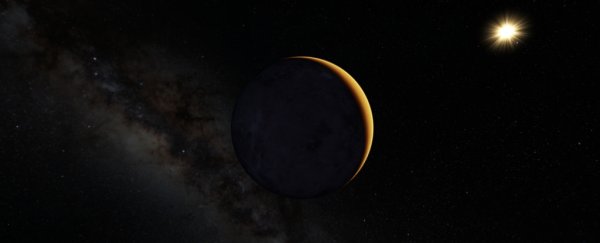What if you tried to fly an airplane on Mercury, Venus, and every other planet in our Solar System? Well, you couldn't do it with just one person - or even with just one plane. Along the way, the harsh environments would destroy both you and your aircraft in a number of horrible ways.
But how exactly would it happen? Randall Munroe, founder of the popular webcomic xkcd, explores the different ways you would crash and die in his entertaining book What If? Serious Scientific Answers to Absurd Hypothetical Questions. Here they are:
Mercury
Planes use the air on Earth to generate a difference in pressure below and above the wings, which produces lift. But there's no atmosphere on Mercury, which means you couldn't even glide on it. If you drove the plane off of a cliff, you'd fall and crash like this:
via GIPHY
Venus
Venus's atmosphere is 60 times more dense than Earth's at the surface, which would be plenty to generate lift. But you'd be flying through air that's over 400 degrees Fahrenheit (204 degrees Celsius) - hot enough to melt lead and, incidentally, set your plane on fire:
via GIPHY
Earth
Earth is a perfect place to fly an airplane, and it comes with an amazing view. Try it some time:
via GIPHY
The atmosphere on Mars is 100 times thinner than Earth's. So the aircraft has to move very fast‚ at about Mach 1, to produce the right difference in pressure above and below the wings to lift off. Once in the air though, you'd be going too fast to have any steering control!
via GIPHY
On Jupiter, the plane weighs 2.3 times more, so you'd need triple the power to fly. Rather than plummeting, the plane would achieve some lift in the atmosphere, so you'd glide at 600 mph (965 kph) toward the centre. If you didn't freeze, you'd be crushed by overwhelming pressure.
via GIPHY
You can maintain flight on Saturn for about the same amount of power as on Earth. However, you'd eventually freeze in the -270 degree Fahrenheit (-167 degrees Celsius) atmosphere and plummet toward the centre, just like on Jupiter:
via GIPHY
Uranus is a very dark, cold place. You and your aircraft would actually weigh less on Uranus than on Earth, so you could fly for as long as it took the plane's fuel to freeze solid in the frigid -350 degrees Fahrenheit (-212 degrees Celsius) environment:
via GIPHY
Neptune
Neptune has the fastest winds of any planet in the solar system, with wind speeds up to 1,500 mph (2,414 kph). If you got caught in one of Neptune's violent storms, your plane - which would freeze in the -360 degree Fahrenheit (-218 degrees Celsius) atmosphere - would be shaken to pieces by turbulence:
via GIPHY
This article was originally published by Business Insider.
More from Business Insider:
